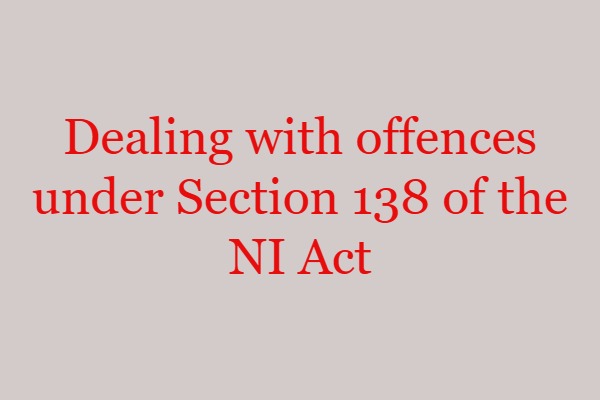Dealing with Offences Under Section 138 of the NI Act
Hello readers and friends! This post is all about all you need to know about offenses under Section 138 of the NI Act . I’m going to keep things super simple and clear, with no extra fluff and nonsense—just easy, step-by-step help so you can understand everything without any confusion. Let’s jump right in!
Step 1: Understanding the Offence
Section 138 NI Act applies when a cheque is dishonoured due to insufficient funds or an amount exceeding the arrangement.
It criminalizes failure to honour a cheque issued towards a legally enforceable debt or liability.
Step 2: Conditions to Constitute an Offence (Checklist)
1.Cheque is issued by the drawer (the person who writes/signs the cheque).
2.Cheque is for discharge of a legally enforceable debt or liability.
3.Cheque is presented within 3 months from the date it is drawn (validity period).
4.Cheque is returned unpaid by the bank due to: Insufficient funds, or Exceeds arrangement.
5.Payee (the person in whose name the cheque is issued) sends a written demand notice within 30 days of bank memo.
6.Drawer fails to make payment within 15 days of receiving the notice.
Only when all above steps are fulfilled, offence under Sec 138 is constituted.
Step 3: Filing a Complaint
Complaint must be filedwithin 1 month from the date the cause of action arises (i.e., 16th day after notice is received).
Magistrate of First Class or Metropolitan Magistrate has jurisdiction.
Step 4: Jurisdiction Rules (as per 2015 Amendment)
If the cheque is deposited through your bank account (you put it in your bank): File the case where your bank branch is located.
If the cheque is presented directly at the drawer’s bank (not through your bank account): File the case where the drawer’s bank branch is located.
Step 5: Court Proceedings
1.Magistrate takes cognizance based on complaint and supporting affidavit.
2.Process issued to the accused.
3. Accused appears or warrant issued if absent.
4. Trial proceeds summarily or as summons case.
5. Accused can:
Deny charges and go to trial.
Pay cheque amount (compounding opportunity).
Step 6: Interim Compensation (Section 143A)
Court may order interim compensation up to 20% of cheque amount.
Not mandatory; discretionary based on merits, financial condition, etc.
Non-payment may lead tobail cancellation or recovery as fine.
Step 7: Appellate Proceedings (Section 148)
Appellate court may orderdeposit of minimum 20% of fine or compensation.
Court can release amount to complainant, subject to refund on acquittal.
Step 8: Compounding of Offence (Section 147)
What is compounding?
It means the complainant agrees to settle the case and drop the charges if compensated.
Can it be done anytime?
Yes, the offence can be settled (compounded) at any stage, but only with the consent of the complainant.
Costs involved depending on timing:
No cost if settled early (first or second hearing).
10% cost of cheque amount if settled later before Magistrate.
15-20% cost if settled at appeal level (higher courts).
What if complainant is satisfied?
Court may close the casein the interest of justice even if it’s later in the process.
Step 9: Lok Adalat Awards
If matter resolved in Lok Adalat, award is enforceable like a civil court decree.
Can be enforced via: Civil court proceedings or CrPC Sec 431 / BNSS Sec 471 procedures (recovery like a fine).
Step 10: Limitation Period Summary
Action Time Limit
| Presenting the Cheque | Within 3 months of issue |
| Sending Demand Notice | Within 30 days of dishonour info |
| Waiting for Payment | 15 days after notice is received |
| Filing Complaint | Within 1 month after cause arises |
Step 11: Best Practices
Verify cheque details and bank account validity.
Maintainproof of notice delivery (registered post, tracking, etc.).
Ensuretimely legal action to preserve rights.
Explorecompounding early to avoid prolonged litigation.
Step 12: Common Pitfalls to Avoid
1.Presenting cheque beyond 3-month validity.
2.Delay in sending legal notice.
3.Filing complaint beyond limitation without condonation.
4.Not verifying if cheque was issued for enforceable debt.
5.Proceeding without proper jurisdiction.
So this is all about 138 NI act proceedings , now let’s understand what role is played by section 143 and 143 (A) of NI act:
So let’s undesrtand both these section step by step without any ambiguity and lots messy content
Step 1: Understanding the Purpose
- Section 138: Covers offence of cheque dishonour.
- Section 143: Lays down procedure for summary trial of cheque dishonour cases.
- Section 143A: Allows courts to order interim compensation up to 20% of cheque amount during trial.
Step 2: Court Jurisdiction & Trial Type (Section 143)
- Cases under Section 138 must be tried by:
- Judicial Magistrate First Class or
- Metropolitan Magistrate.
- These trials must be conducted as summary trials.
Step 3: Trial Procedure Under Section 143
- Follow summary trial rules under Sections 283 to 288 of BNSS.
- If summary trial isn’t suitable, Magistrate may shift to a regular trial.
- Trials should be conducted day-to-day until concluded.
- Aim: Complete within 6 months from filing the complaint.
Step 4: Controlling Delays
- Adjournments allowed only with valid reason (to be recorded in writing).
- Courts must ensure fast examination of witnesses and evidence.
- Complainant’s affidavit is acceptable as evidence (Section 145).
Step 5: Interim Compensation (Section 143A)
- Court may order drawer (accused) to pay up to 20% of cheque amount:
- Only after accused pleads not guilty.
- Compensation must be paid within 60 days (extendable by 30 more days).
- If not paid, recovery as per Section 461 BNSS (attachment and sale of property).
Step 6: Discretion & Flexibility
- Courts have discretion (not mandatory) to grant interim compensation.
- Based on fairness, case context, and financial hardship.
Step 7: Summary Trial Advantages
- Fast-track disposal.
- Reduces case backlog.
- Avoids lengthy litigation for minor cheque dishonour cases.
- Builds confidence in financial transactions.
Step 8: Key Supreme Court Guidelines
- India Bank Association v. Union of India (2014):
- Complete complainant’s evidence and cross-examination within 3 months.
- M/S. Mandvi Co-op Bank v. Nimesh Thakore (2010):
- Affidavits accepted as primary evidence.
- Damodar Prabhu v. Sayed Babalal H. (2010):
- Compounding allowed at any stage with graded costs.
Step 9: Enforcement & Penalties
- If interim compensation is unpaid:
- Court can enforce payment via property attachment.
- Serious step to ensure compliance.
- Section 143A applies only to offences after Sept 1, 2018.
Step 10: Differences Between Section 143 and 143A
| Section | Purpose | When Applied | Key Feature |
|---|---|---|---|
| 143 | Summary trial procedure | From complaint filing | Fast-track case resolution |
| 143A | Interim compensation | After plea of not guilty | Financial relief to complainant |
Step 11: Best Practices for Legal Teams
- Push for early trial and avoid unnecessary adjournments.
- Prepare complainant’s affidavit in advance.
- File timely requests for interim compensation (if needed).
- Monitor and enforce payment timelines.
Step 12: Final Objective
To ensure cheque dishonour cases are:
- Resolved quickly.
- Complainants receive early financial relief.
- Courts avoid unnecessary burden.
So both these sections, 143 & 143A ensure speed, fairness, and accountability.
Now Let’s Undestand Some Common Tricks & Loopholes Used by Defaulters
So here are some tricks used by defaulters:
1. The Delay Tactics
Repeated adjournment requests citing vague reasons (e.g., illness, unavailability of documents).
Non-appearance in court, forcing repeated summons or warrants.
Changing lawyers frequently to reset the timeline.
Counter: Section 143 discourages adjournments unless justified and recorded. Push for day-to-day hearing.
2. The Technical Defects in Legal Notice
Claiming notice was not received (refuse delivery, incorrect address).
Challenging notice contents: That it lacked a clear demand or legal basis.
Counter: Send notice via registered post with tracking, and save delivery report. Use multiple modes (email, courier, etc.).
3. Disputing Legally Enforceable Debt
Accused may say:
Cheque was given as a gift, security, or loan that’s already repaid.
No documented agreement exists to prove liability.
Counter: Ensure you preserve invoices, messages, emails, or any written agreement—even WhatsApp chats.
4. Misusing “Stop Payment” Instructions
Drawer stops payment and argues no offence occurred.
Counter: Supreme Court (e.g., Modi Cements v. Kuchil Kumar Nandi) has ruled that even stop payment cheques attract Section 138 if debt is proven.
5. Filing False Counter-Complaints
To harass the complainant and create a smokescreen, the accused might file:
FIRs for harassment or cheating.
Civil suits to challenge liability.
Counter: File for quashing of such cases as abuse of process under Section 482 CrPC.
6. Challenging Interim Compensation (Section 143A)
Argues financial incapacity or abuse of discretion by the Magistrate.
Requests suspension of order through appeals or revision.
Counter: File for enforcement under Section 461 BNSS (property attachment) if not paid within 60+30 days.
7. Exploiting Judicial Discretion
Since Section 143A is discretionary, the accused might influence delay in its application by painting themselves as victims or negotiating behind-the-scenes.
Counter: Highlight precedents and financial hardship faced by the complainant to press for immediate relief.
8. Postdated or Undated Cheques Argument
Claims cheque was postdated or undated and misused by complainant.
Counter: Always present context of cheque issuance (email, messages, audio recordings).
9. Delay in Filing Complaint
Exploit delay beyond statutory limits:
Cheque not presented within 3 months.
Legal notice sent after 30 days.
Complaint filed after 1 month from notice lapse.
Counter: Follow strict timelines. If delayed, include a delay condonation application under Section 142.
10. Contesting Jurisdiction
Accused may argue the court doesn’t have territorial jurisdiction (especially if cheque deposited in a different city).
Counter: Amendments in 2015 clarify jurisdiction lies where payee’s bank is located (if deposited through account).
Final Takeaway for Complainants
Most tricks revolve around delay, technical loopholes, and shifting the burden of proof.
Your speed, documentation, and strategic legal action are key, to recover your money from the defaulter or willing defaulter with clean malafied intention to cheat.
Bibhu Mishra is a prolific writer who has published many books spanning various genres. He is a legal enthusiast and an avid researcher of cutting-edge technology, diving into fascinating realms to bring captivating narratives to life.



